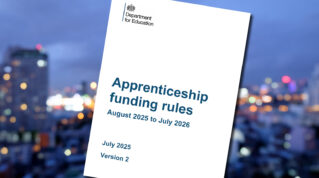Up to 2,000 apprentices are to be recruited to an 18-month long pilot of flexi-job apprenticeships.
The Education and Skills Funding Agency (ESFA) has said today that they are looking for 40 training providers to take part in the pilot, which could also involve thousands of employers.
Boris Johnson first revealed the government’s intention for “portable” apprenticeships in a speech on skills reforms at Exeter College in September 2020. He said: “Suppose you are in a small start-up making videos for Youtube, and the project ends – so you’ve got to move to another such small company. Under our plans, you will be able to take that apprenticeship to your new employer and it won’t die with the end of the contract.”
Policymakers hope that the flexi-job model will enable more people to do apprenticeships in industries which typically employ people on shorter term contracts, or where self-employment is common. The apprenticeship standards chosen for this pilot all fall within the creative, digital and construction industries (full list below).
The pilot will start this April and will run until run until December 2023. There will be a review point in January 2023 where, if the pilot is proving successful, more standards will be added.
Apprentices recruited on the pilot will, with the help of their provider, be responsible for sourcing employment contracts of at least three months, up to the minimum set duration of their standard.
For example, a flexi-job apprentice on the ‘software developer’ standard could in theory have eight employers over the course of their 24 month apprenticeship.
If an apprentice is between jobs for longer than 30 days, they will be placed on a break in learning, which remain unfunded. Only the time spent in employment will count towards the duration of the apprenticeship.
Members of the leadership team* of the National Society of Apprentices (NSoA), who are apprentices themselves, warned that not giving providers taking part in the pilot more funding was a “tall ask… what do they cut, compared to someone who stays with a single employer?” they said.
An apprenticeship with multiple employers comes with other risks, NSoA leaders told us. “It’s tough finding a good employer as an apprentice. If you’re jumping from employer to employer, how do you know? At least with an apprenticeship training agency (ATA) they get to build relationships with local employers over time, seeing who’s good and who to avoid. That responsibility must sit with the training provider, not the apprentice.
“We get one shot at our apprenticeship” they added.
Training providers successfully recruited on to the pilot programme will not receive any extra funding, but will have a number of extra responsibilities. Providers will be required to conduct progress reviews and update training plans with the apprentice between each employer, process breaks in learning between employers (if the gap is over 30 days) and be responsible for recording off-the-job training hours with each employment contract.
Expression of interest documents, seen by FE Week, stress that providers must be confident they can meet their starts targets and state that half of planned starts should begin within the first 6-9 months of the pilot.
The Association of Employment and Learning Providers (AELP) welcomed the pilot as a way to “address challenges in working patterns, which would otherwise prevent people in many industries from undertaking an apprenticeship”.
AELP’s chief executive, Jane Hickie, told FE Week that one of the main issues that needed to be addressed in the pilot was the way providers are held to account because “the success rate methodology unfairly penalises providers when an apprentice changes employer with an employment gap of over 30 days.
“Providers should also not face any additional administrative costs in delivering the programme,” Hickie said.
This pilot model, where apprentices find their own series of employers, is one of two delivery models for flexi-job apprenticeships. The other involves new ‘flexi-job apprenticeship agencies’ which will act as the employer and arrange placements with host businesses for the apprentice. A £7 million development fund was launched in August to set up these new agencies however DfE have missed their own deadline, December, to reveal the successful bidders.
Providers that are currently on the Register of Apprenticeship Training Providers have until January 28 to apply.
*The members of the National Society of Apprentices leadership team are Sarah Tatler, Annabel May, Simon Phip and Tony Scannell.
List of apprenticeship standards that are part of the flexi-job apprenticeships pilot.
Creative
Creative Venue Technician/Live Events Technician
Props Technician
Museums and Galleries Technician
Archaeological Technician
VFX artist or Technical Director
Junior VFX Artist
Camera Prep Technician
Broadcast and Media Systems Technician
Photographic Assistant
Cultural Heritage Conservation Technician
Junior Content Producer
Cultural Learning and Participation Officer
Digital
Game Programmer
Software Development Technician
Software Developer
DevOps Engineer
Construction
Advanced Carpentry and Joinery
Stonemason
Industrial Coatings Applicator
Smart Home Technician
Construction Site Supervisor
Bricklayer
Rail Infrastructure Operator

















Your thoughts